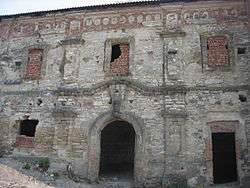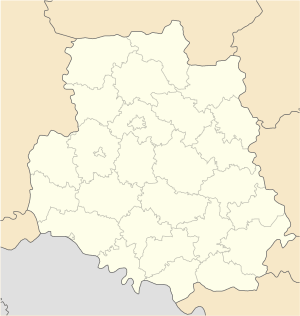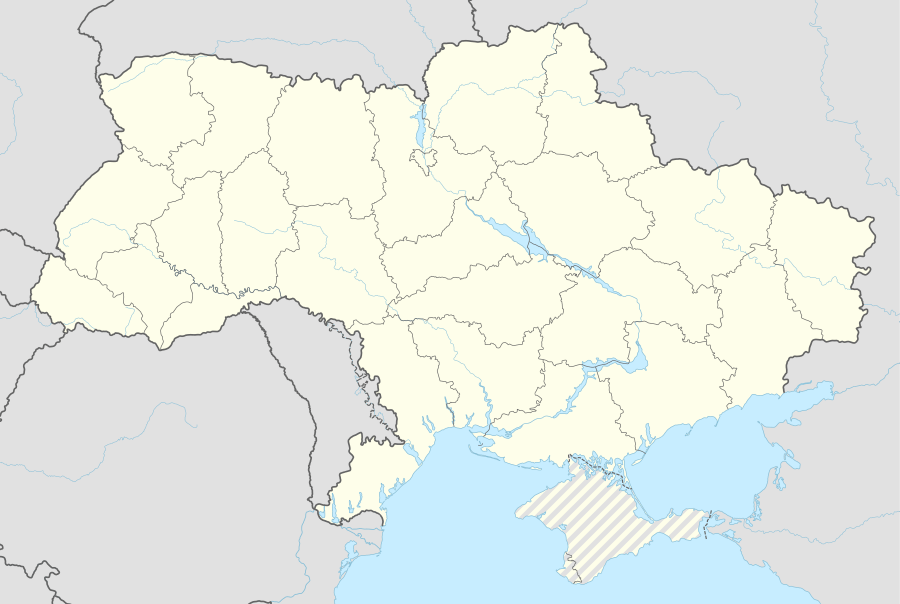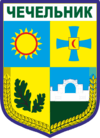Chechelnik
| Chechelnik | ||
|---|---|---|
| Urban-type settlement | ||
 The Synagogue of Chechelnyk, late 18th century | ||
| ||
 Chechelnik  Chechelnik | ||
| Coordinates: 48°13′01″N 29°21′00″E / 48.217°N 29.350°ECoordinates: 48°13′01″N 29°21′00″E / 48.217°N 29.350°E | ||
| Country |
| |
| Province |
| |
| District | Chechelnik Raion | |
| Area | ||
| • Total | 7,94 km2 (307 sq mi) | |
| Population (2015) | ||
| • Total | 5,132 | |
| • Density | 6.5/km2 (17/sq mi) | |
| Time zone | UTC+2 (EET) | |
| • Summer (DST) | UTC+3 (EEST) | |
Chechelnyk or Chechelnik (earlier also Chichelnik; alternate spellings Chetschelnik, Chitchilnik, Cicelnic, Czeczelnik, Tschetschelnik[1]) (Ukrainian: Чечельнúк, Russian: Чечельни́к) is an urban-type settlement on the Savranka River (a tributary of the Southern Bug) in Vinnytsia Oblast, Ukraine, near Odessa Oblast, located in the historic region of Podolia. Chechelnyk is the administrative center of Chechelnyk Raion, one of 33 regions of Vinnytsia Oblast. The economy is based on the food industry, especially alcohol production. Population: 5,132 (2015 est.)[2]
The Brazilian writer Clarice Lispector was born in the town on December 10, 1920, during a pause in the family's journey to escape Russia.
History
![]()
![]()
![]()
![]()
![]()
![]()
![]()
![]()
![]()
![]()
Chechelnik was founded "as a refuge from Tatars and landlords"[3] in the early 16th century and achieved the status of a town in 1635. Until the Partitions of Poland Czeczelnik was part of the Bracław Voivodeship of the Lesser Poland Province of the Polish Crown. It was a private town of Poland, owned by the House of Lubomirski[4][5].
Later it became part of the Podolian Governorate of the Russian Empire. Between 1795 and 1812 it was renamed Olgopol. In 1898 the population was 7,000, of whom 1,967 were Jews. Like most of Podolia, the town suffered terribly during the Russian Civil War; during the summer of 1920, "the south of Podolia seethed with counterrevolution... and Olgopol County, where Chechelnik is located, was the most unstable area in all of Podolia."[6]
References
- ↑ Gary Mokotoff, Sallyann Amdur Sack, and Alexander Sharon, Where Once We Walked: A Guide to the Jewish Communities Destroyed in the Holocaust (Avotaynu, 2002: ISBN 1-886223-15-7), p. 57.
- ↑ "Чисельність наявного населення України (Actual population of Ukraine)" (PDF) (in Ukrainian). State Statistics Service of Ukraine. Retrieved 1 July 2016.
- ↑ Benjamin Moser, Why This World: A Biography of Clarice Lispector (Oxford University Press US, 2009: ISBN 0-19-538556-X), p. 32.
- ↑ Geographical Dictionary of the Kingdom of Poland, vol. 1, p. 781
- ↑ Микола Крикун, "Воєводства Правобережної України у XVI-XVIII століттях: Статті і матеріали", p. 524
- ↑ Moser, Why This World, p. 32.
